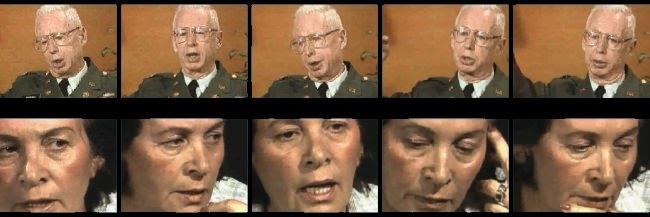Subject Heading Guide
Guide to Subject Headings Used at the Fortunoff Video Archive
Guide to Subject Headings Used at the Fortunoff Video Archive
The Fortunoff Video Archive for Holocaust Testimonies is a collection of over 4,400 videotaped interviews with witnesses and survivors of the Holocaust. Part of Yale University's department of Manuscripts and Archives, the archive is located at Sterling Memorial Library
Fortunoff Video Archive for Holocaust Testimonies
Yale University Library
PO Box 208240
New Haven, CT 06520-8240
Phone: (203) 432-1879
Fax: (203) 432-7441
E-mail: fortunoff.archive@yale.edu
Shipping address:
Sterling Memorial Library
130 Wall Street
New Haven, CT 06520-8240

Screenshots from Fortunoff Video Archive testimonies
A Jesuit priest, who during the war was a seminarian in Hungarian-occupied Košice, now Slovakia, vividly describes two personal encounters with the suffering and horrors of the Holocaust, and laments his inability to intervene or protest on behalf of the victims. A religious Jew from Poland describes the liquidation of the Jews of his town, including the murder of his grandmother, which he witnessed. He speaks of his experiences in slave labor and concentration camps, and tells how he was able to retain his faith and humanity in spite of his wartime experiences.
Survivors and witnesses describe their experiences during the Holocaust period. Included are a Jesuit priest who was a seminarian in Hungarian-occupied Czechoslovakia; a Jewish woman who was a young girl in Łosice, Poland; another who was deported from the Warsaw ghetto to Majdanek; a Jewish male survivor of Skarżysko-Kamienna; and a woman survivor or Auschwitz.
A physician, Fred O. recalls the health problems resulting from pervasive lice in the Warsaw and Hrubieszów ghettos. He describes his futile attempt to save his parents and the last time he saw them before their murder at a mass grave outside of Hrubieszów, then discusses his sadness at liberation, and others taking revenge on their guards.
Survivors' reflections on the effects of their Holocaust experiences upon their lives and those of their children.
A survivor of the Warsaw Ghetto, Majdanek and Auschwitz relates her wartime experiences and describes her postwar reunion with her husband, whom she had married in the ghetto at the age of 16. She emphasizes her determination to survive as an act of defiance against Hitler, a decision she reached when her younger brother died in her arms in the cattle car en route to Majdanek. The theme of resistance, both passive and active, recurs throughout her testimony. Ms. K.
Illustrating his recollections with photographs, a child survivor from Humenné, Slovakia describes an early childhood full of love and warmth in spite of the death of his father when he was three years old. With evident pride in his own resourcefulness and that of the adults who cared for him, he relates his wartime experiences of flight, hiding, and living "on the Aryan side" in the manner of an adventure story, though it is told against the backdrop of the disappearances and deaths of family members - grandfather, favorite cousin, beloved stepfather - until only he and his mother remain.
A survivor from eastern Czechoslovakia relates her wartime experiences in an emotionally powerful and unusually poetic way. She tells of her family's evacuation to a brick factory, their train journey to Auschwitz, and their separation upon arrival. She describes her life in Auschwitz and later in Salzwedel, where she worked as a cook for the SS. Ms. P. recounts the joy of liberation by American soldiers and concludes by expressing her distress at her own, and the world's complacency while suffering and inhumanity continue.